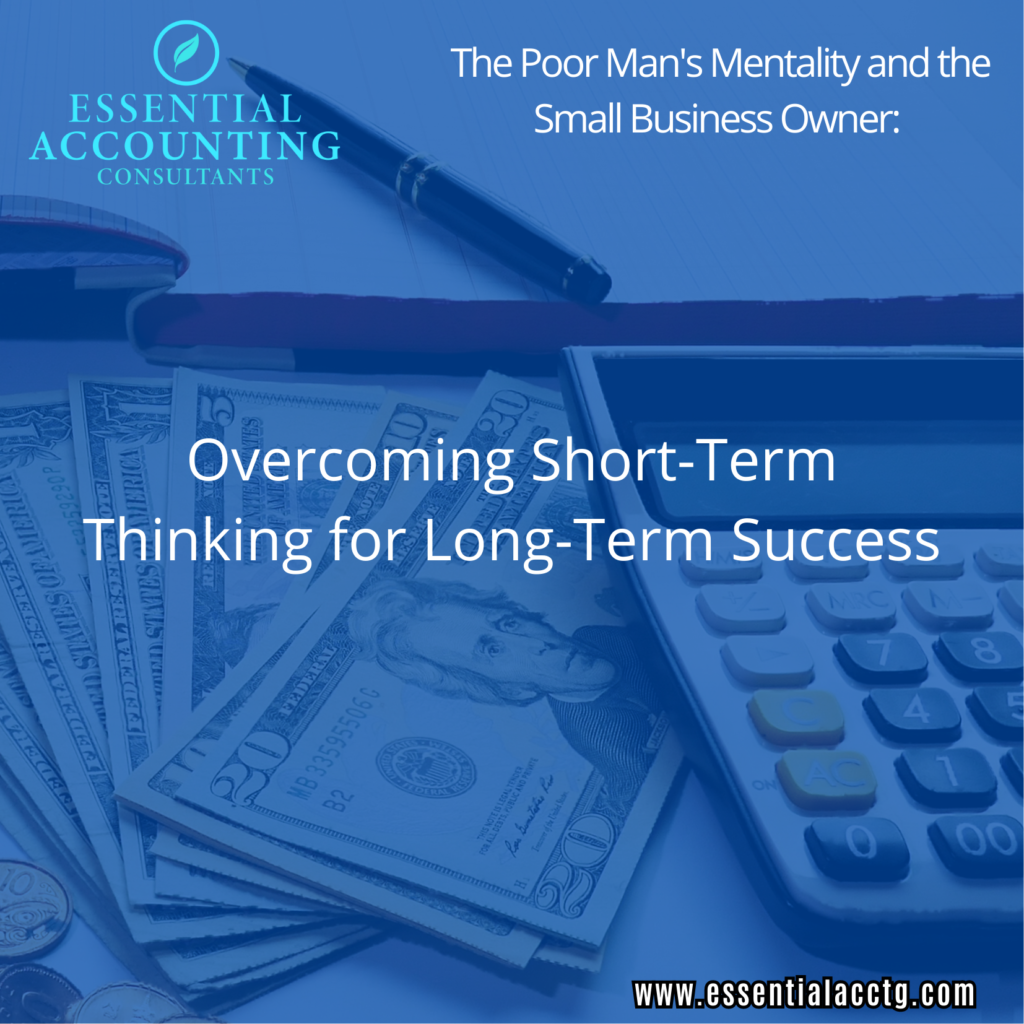“From Penny-Pinching to Profit: Rethinking the Small Business Mindset”

The Poor Man’s Mentality and the Small Business Owner: Overcoming Short-Term Thinking for Long-Term Success
By Robin Boyd for Essential Accounting Consultants
I, along with a few friends and colleagues, recently attended the “All Black Affair,” a glitzy event designed to showcase the power of collaboration. Everyone chipped in for the ticket, table, and a bottle of top-shelf champagne, an experience symbolic of shared success. However, an incident during this otherwise flawless evening made me reflect on a mindset that is, unfortunately, all too common among many, including small business owners: the “Poor Man’s Mentality.”

The $2 Dilemma
When the bill came due, most participants settled it without a hitch. But one individual balked at a $2 service fee on a PayPal transaction, preferring to go the Zelle route instead. What stood out was not the preference for another payment method but the resistance against a minimal service charge.
Ironically, during the event, this individual took part in helping to consume additional bottles of expensive alcohol without hesitation.
This incident highlights a mindset that prioritizes short-term savings over long-term value, a trap many small business owners can fall into, often to their detriment.
What is the Poor Man’s Mentality?
The “Poor Man’s Mentality” is not about having limited resources, but rather, it’s a mindset that hinders growth. It prioritizes short-term, often insignificant savings or gains over long-term success and substantial growth. It’s a fear-driven approach that prevents risk-taking and innovative thinking and often results in missed opportunities.
How does this mindset affect small business owners?
- Stifling Growth: Entrepreneurs with this mentality might avoid investing in essential tools, technology, or workforce to grow their businesses, thinking they’re saving money. In reality, they might be hindering potential growth or efficiency.
- Eroding Partnerships: Nitpicking over minor costs can damage relationships with vendors, employees, or partners, which can be more costly in the long run.
- Missed Opportunities: Focusing on minute savings can blind one to larger, more profitable opportunities. While one might save a few dollars occasionally, one might miss out on thousands in potential revenue or beneficial partnerships.
Overcoming the Poor Man’s Mentality
- Value over Cost: Always assess the value something brings rather than just its cost. A tool might be expensive, but if it enhances productivity tenfold, it’s worth the investment.
- Think Long-Term: Short-term savings can lead to long-term losses. Always assess decisions based on their long-term impact on your business.
- Seek External Perspectives: Sometimes, we’re too close to a situation to see objectively. Seeking advice from mentors, peers, or consultants can provide valuable outside perspectives.
- Invest in Growth: Don’t be afraid to invest in opportunities that promise growth, even if there’s a cost involved. This could be in terms of training, technology, or partnerships.
In conclusion, while being financially prudent is essential, it’s equally critical to avoid falling into the trap of the “Poor Man’s Mentality.” The key is to focus on value, growth, and long-term success, even if it means occasionally spending more in the short term. Remember, the mindset with which you approach your business decisions can be the difference between stagnation and flourishing success.
Are you a small business owner seeking to shift from a limiting mindset to one of growth and prosperity? Connect with Essential Accounting Consultants today, and let’s co-create your path to success!
Click HERE now!
#BusinessGrowth #EntrepreneurMindset #OvercomingBarriers #SmallBusinessSuccess #LongTermThinking #RobinBoyd #TaxServices #Bookkeeping





Recent Comments